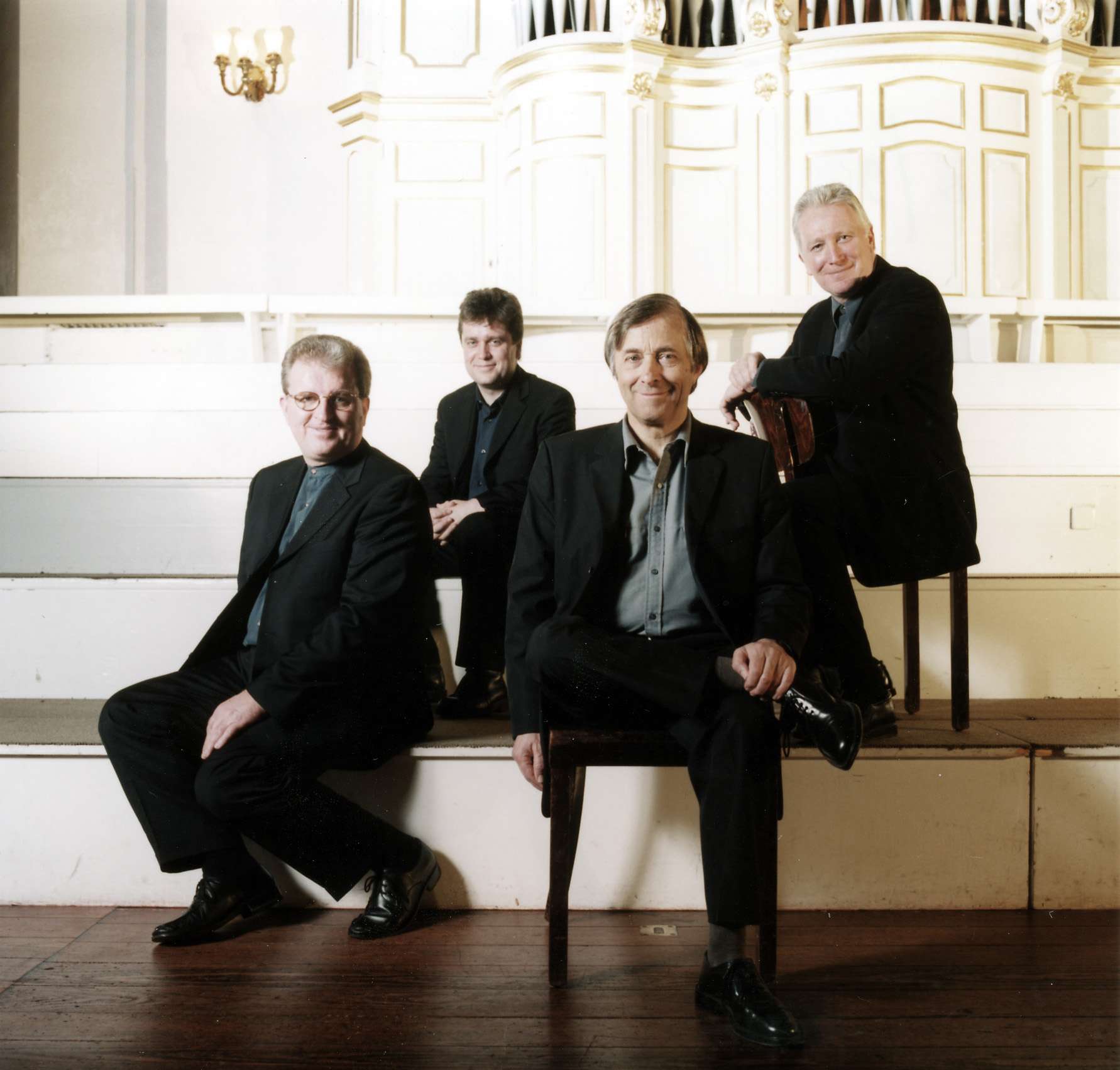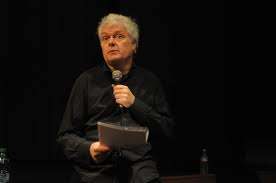|
Back
A Minuscule Ado About Nothing New York
Rose Theater, Lincoln Center
11/13/2012 -
Heiner Goebbels, with texts by T.S. Eliot, Maurice Blanchot, Franz Kafka, and Samuel Beckett: I Went To The House But Did Not Enter
The Hilliard Ensemble: David James (Counter-tenor), Rogers Covey-Crump, Steven Harrold (Tenors), Gordon Jones (Baritone)
Klaus Grünberg (Lighting Design, Staging), Florence von Gerkan (Costume Design), Willi Bopp (Sound Design), Heiner Goebbels, (Conception, music, and Director)

The Hilliard Ensemble (© Friedrun Reinhold)
Those dozen-odd people who walked out of Heiner Goebbels’ I Went To The House But Did Not Enter did not have my sympathy. The 90-odd-minute “theater-music” conception could have been called tedious. But that tedium was outweighed by the brilliance of three sets, the most imaginative lighting, and of course the Hilliard Ensemble, four singers best known for Medieval and Renaissance music.
Mr. Goebbels probably wrote the music for them in mind, since–outside of some Benjamin Britten-like harmonies–most had the plodding repetitive closely clustered feeling of early Church music, with barely a contrapuntal line at all.
In fact, except the last tableau, the work had little singing. And little acting. And little of anything. Like the television series, Seinfeld, Goebbels’ I Went To The House But Did Not Enter was about...well, nothing. Four men doing nothing. The difference was in style. Seinfeld’s nothingness glittered from the most talented comedy writers. I Went To The House But Did Not Enter had the highest esteemed serious writers.
In Tableau Number One, the four men of the Hilliard Ensemble stood in a room decorated with many shades of gray, including a gray table, gray flowers and...oh, yes, they were all wearing gray suits. Here, they folded and unfolded napkins putting them a large box, taking them out and putting them back in the box again, then unfolding the table and putting that together. Daytime, nighttime and back to the day (this time with a whitish flower).
Then they sung The Love Song of J. Alfred Prufrock.
This was 1950’s avant-garde, a Theater of the Absurd, with deathly solemnity replacing Ionesco-like absurdity
In Tableau the Second, the set was like a monstrous dollhouse-with three windows and a garage, out of which the singers sing about life and death written by a writer new to me, Maurice Blanchot. After this came an interval where the four men sing lines from Franz Kafka, and one of them rides off on a bicycle.
Tableau the Third takes place in large ugly hotel room where the four men reside. But they do chant words from Samuel Beckett’s opaque Worstward Ho. They also look at television, and watch a slide show, until one of the slides of a seaside gets real waves and the curtain falls.
Now who could possibly think of walking out of this show?

H. Goebbels (© Wikipedia)
Actually, I had no intention of leaving, though it offered neither momentum or drama or tension or wit. Yes, the feelings were moribund, but I was still curious as to what the hell was happening (Nothing). Or had happened. (Nada) Or what would happen. (Ditto)
Not coincidentally, “nothing” was the key word from the Becket section (as well as his famous phrase, “Fail again. Fail better”). But Mr. Goebbels (who was present last night) did have his style. The “napkin” episode was so serious that it began to represent a ritual. And then I started to look at it like the drama of the Medieval Church, where every movement had a secret meaning).
The “house” tableau was mundane in its words, and the actions (or inaction of the four residents). So how delightful when we heard sounds of rain, the shadow of a tree, phones, a car, and a dog barking. (the latter was behind part of the music, Mr. Goebbels’ only attempt at humor).
Finally the hotel room. Why they are there is like asking why Sesame Street’s Bert and Ernie live together. They just do. These men wander around, their chanting is incessant (if not always understood), and at the end when a seaside shot becomes real and the wave begin to flow, we almost–almost–feel their nostalgia, their remembrance of quotidian things past.
In a way the production was so striking that it belied the nihilistic message. The scene-changing was done with more energy than the tableaus. But the lethargy of the tableaus (actually not so much lethargy as the result of physical confinement ranging on the paranoid) was like a parody of the tedium we in the audience could have felt.
And the Hilliard Ensemble is still the best in the world for the music they sing. Mr. Goebbels is a pretty estimable composer, but he held back here until the lines from Worstward Ho. What he did compose had a medieval feeling, albeit with near-modern harmonies.
Usually during the White Light Festival, I enjoy the complementary drink after the concert and/or a long walk through Manhattan to digest the material. Last night, I hardly felt that. I felt unsettled, empty, vacant. The main feeling was disappointment Heiner Goebbels’ capital-N “Nothingness” was a stylish but minuscule ado about nothing.
ConcertoNet is on Facebook
Twitter: @concertonet
Harry Rolnick
|